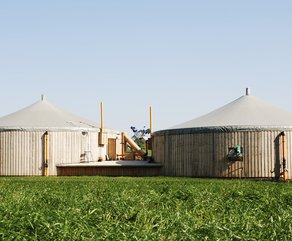Biomass: An Important Economy Booster Resource
Biomass
With new technologies Biomass which is derived from plant or animal-based organic matter, can produce different energy related products such as electrical energy, heat, chemicals, liquid and solid gaseous fuels.
Some sources include municipal wastes, trees, wood waste and residues, animal wastes such as (manure), agricultural feed crops (waste and residues), landfill gases (rotting garbage), aquatic plants, and other organic waste materials. These sources are used to generate electricity and heat, and are also used to produce bio-fuels such as Ethanol, Bio-diesel, and Bio-products.
Being able to be replenished makes it renewable compared to fossil fuels such as natural gas and coal, and Biomass is easy to grow, to utilize, and can be quickly replaced without depleting our Natural Resources.
Bio-energy: Renewable and Sustainable
Used directly or indirectly, Bio-energy can produce a variety of renewable energies such as electrical power and fuels. Methane taken from Bio-gas a technology called Anoerobic Digestion, is done by the collection of organic waste material in oxygen-free tanks also called Digesters , and decomposed by anaerobic bacteria. It can then be formed into a renewable Natural gas that can be purified and used to produced electricity or heat.
Another form of Energy from Biomass is Direct combustion. This is the production of electricity by the burning of waste wood products from agriculture and wood processing plants in conventional boilers, which produces high pressured steam causing the spinning of turbines and activating generators to produce electricity.
Co-firing is a process used in existing coal fired power plant furnaces by replacing a portion of coal with Biomass ( the combusting at the same time of two different type of materials). Co-firing can significantly reduce the sulphur dioxide emissions produced by the burning coal and be a very cost efficient energy option.
Another process is Gasification. This process produces a synthetic gas (syngas) by heating dry Biomass material to high temperatures in an oxygen starved environment. Syngas consists mostly of carbon monoxide and hydrogen and can be burned in conventional boilers to produce electricity and can be used to replace Natural gas in combined-cycle gas turbines, in the latest natural gas power plants making them achieve much higher efficiency.
Bio-fuels: An Alternative to Conventional Fuels
The conversion of Biomass into Bio-fuels from plants or plants-derived materials could reduce gasoline demands, benefit our energy security, our economic growth, and our environment.
Two of the most common types of liquid fuels are Ethanol and Bio-diesel. Ethanol is a high-octane fuel which is blended with gasoline for use in vehicles, while Bio-diesel produced from agricultural or recycled vegetable oils and animal fats can also be blended with Petroleum Diesel to make an alternative fuel. it's non-toxic, biodegradable and cost efficient.
Solid Bio-fuels is the processing of raw Biomass such as wood sawdust, grass clippings, domestic refuse, charcoal, agricultural waste, non-food energy crops, and dried manure.
Some solid fuel applications are pellets, cubes or pucks, also firewood that can be burned directly in a stove or a furnace for heat or steam. Another fuel product is Bio-char, made from agricultural waste it can be an alternative to wood charcoal.
Bio-Products Facts

Three categories of Bio-products are: Bio-fuels as liquid, solid, and gaseous fuels in the form of ethanol, bio-diesel, pellets, or char, and bio-gas.
Bio-materials: Plastics, foams, and composites.
Bio-Chemicals: Pharmaceuticals, industrial, and cosmetics. These products are made from sources with some components of biological or renewable materials, and they can have economical, environmental, and health benefits.
Products like these can significantly contribute to the bio-economy with the development of new industries and products which will increase economic opportunities, and reduce our dependency on non-renewable fossil fuels.
Bio-products can also benefit the environment by the reduction of green house gas emissions with the manufacturing of some products, compared to the use of petroleum-based ones.
Production of inexpensive drugs and vaccines by genetically modified plants and natural medicinal compound sources, can have great health benefits.
Biomass Issues
Some issues have been environment, deforestation, soil erosion, impact on water resources, and the cost.
The US Department of Energy (DOE) Bio-energy Technologies Office, along with Natural Resources Canada are committed to the development of Bio-energy that do not compromise the quality of the environment, that is cost-effective, that will have minimal impact on soil and water resources, and on our forests.
International Energy Agency (IEA) is an organization that is working to improve the cooperation and the sharing of Information between countries (seventeen of them so far), that have national programs of Bio-energy research development and deployment.
Biomass being an extensive, sustainable energy resource will someday meet most of our energy needs in transportation, agriculture, residential electricity and heat.
For more Information see Alternative Energies and Bio-energy
Also see Bio-fuels, Bio-Products

Questions or Comments?
Please use Contact Form below...


